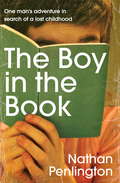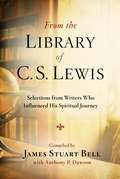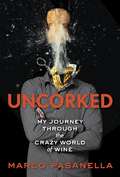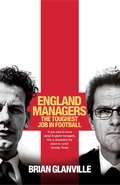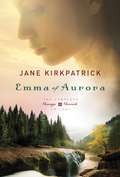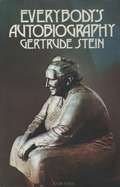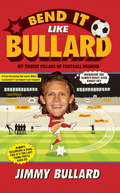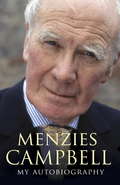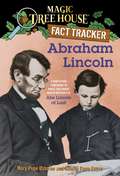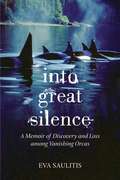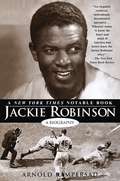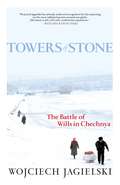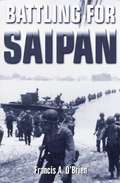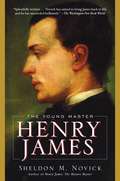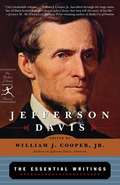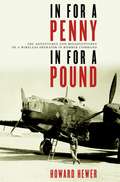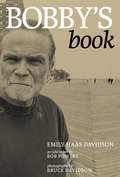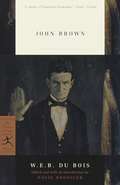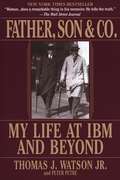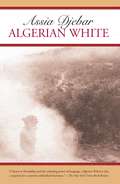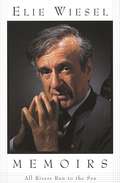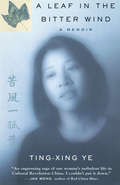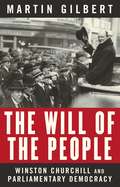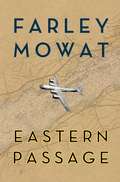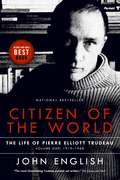- Table View
- List View
The Boy in the Book
by Nathan PenlingtonWhen Nathan discovered a job lot of the first 106 adventures for sale on eBay, there was never any question that he would place a bid. When the books arrived, he lost himself in the old adventures. Yet, as he flicked through the pages, there was another story being written. In the margins of each book were the scribblings of the little boy who had once owned them, a little boy by the name of Terence John Prendergast. Terence wrote jokes and hints for adventurers following the same stories as him. More troubling, among the notes were intimations of a tormented childhood: of the boys and teachers who bullied him; of the things he hated about himself and had to improve; of his thoughts of suicide and his desperate need to find friends, be liked, and find somebody - anybody - to confide in. THE BOY IN THE BOOK is Nathan's poignant recreation of the discovery of the fragments of Terence Prendergast's diary, his quest to find the lost boy, and the friendship that resulted from their first meeting. In doing so, Nathan is forced to examine his own childhood - and, as his relationship with Terence deepens, he begins to believe that the two men are not so different, and to reflect on the darkness that can exist in childhood.
From the Library of C. S. Lewis: Selections from Writers Who Influenced His Spiritual Journey
by James Stuart Bell Anthony P. DawsonDiscover great truths from C. S. Lewis's mentors C. S. Lewis was perhaps the greatest Christian thinker of the twentieth century. He delighted us inThe Chronicles of Narnia, intrigued us inThe Screwtape Letters, mystified us in The Space Trilogy, and convinced us inMere Christianity. His influence on generations of Christians has been immeasurable. But who influenced C. S. Lewis? What were the sources of his inspiration? Who were his spiritual mentors? Who were his teachers? Drawn from Lewis's personal library, annotations, and references from his writings, the selections in this book bring us into contact with giants such as Dante, Augustine, and Chaucer, as well as introduce us to more contemporary writers such as G. K. Chesterton, Charles Williams, George MacDonald, and J. R. R. Tolkien. Over 250 selections provide a vast array of inspiration from those who have shone forth as messengers of light in Lewis's own thinking, writing, and spiritual growth. A rare glimpse into the intellectual, spiritual, and creative life of one of literature's great writers,From the Library of C. S. Lewisis a treasury of insight and wisdom. From the Hardcover edition.
Uncorked: My Journey Through the Crazy World of Wine
by Marco PasanellaMarco Pasanella's behind-the-scenes memoir through the world of wine will captivate wine lovers with its story of one man who decided, at age 43, to change his life by opening a wine shop.As Kitchen Confidential and Waiter Rant explored the front and back of the house at restaurants, Uncorked offers a peek behind the curtain of the wine world. Pasanella takes the reader into the underbelly of his store and the industry, which is steeped in history yet fanatical about technology and brimming with larger-than-life personalities. Infused with rich details of his historic waterfront building in New York City and his sojourns to Tuscany, Pasanella's memoir is one of transformation through a project many fantasize about but few commit to. A colorful cast of characters rounds out this fascinating journey through the world of wine.
England Managers
by Brian GlanvilleThe England national team has had 12 full-time managers and Brian Glanville has known them all. In this fascinating account of each man his strengths, weaknesses and impact on the game Brian Glanville provides an in-depth analysis of the team as well as the individuals under scrutiny. Funny, controversial, measured and thought-provoking, Glanvilles assessment of why England has underachieved is required reading for all football fans and for every member of the FA Committee if they are prepared to confront some unpalatable truths.On Revie: He was never cut out for the lonely exposed life of an international manager almost pathologically thin-skinned.On Robson: A mixture of good and bad luck characterised his years. He never seemed fully in control.On Venables: Highly competent but appointed a few years too late.On Hoddle: A curates egg of a regime.'
Emma of Aurora: The Complete Change and Cherish Trilogy: A Clearing in the Wild, A Tendering in the Storm, A Mending at the Edge
by Jane KirkpatrickThe Change and Cherish trilogy, based on the true story of Emma Wagner Giesy, now available in one volume: A Clearing in the Wild When Emma's outspoken ways and growing skepticism lead to a clash with the 1850s Bethel, Missouri colony's beloved leader, she finds new opportunities to pursue her dreams of independence. But as she clears a pathway West to her truest and deepest self, she discovers something she never expected: a yearning for the warm embrace of community. A Tendering in the Storm Determined to raise her children on her own terms, Emma suddenly finds herself alone and pregnant with her third child, struggling to keep her family secure in the remote coastal forest of the Washington Territory. As clouds of despair close in, she must decide whether to continue in her own waning strength or to humble herself and accept help from the very people she once so eagerly left behind. A Mending at the Edge As a mother, daughter, sister, and estranged wife, Emma struggles to find her place inside--and outside--the confines of her religious community. Emma reaches out to others on the fringe, searching for healing and purpose. By blending her unique talents with service to others, she creates renewed hope as she weaves together the threads of family, friends, and faith.
Everybody's Autobiography
by Gertrude SteinEverybodys Autobiography is among the very best of Gertrudes writing--[it] speaks with the true and original voice of Gertrude Stein, without apparent art or bravado. --Janet Hobhouse~In 1937, Gertrude Stein wrote a sequel to The Autobiography of Alice B. Toklas, but this darker and more complex work was long misunderstood and neglected. An account of her experiences as a result of writing a bestseller, Everybodys Autobiography is as funny and engaging as The Autobiography of Alice B. Toklas, but it is also a searing meditation on the meaning of success and identity in America. Posing as the representative American, Stein transforms her story into history--responding to the tradition of Thoreau and Henry Adams, she writes: "I used to be fond of saying that America, which was supposed to be a land of success, was a land of failure. Most of the great men in America had a long life of early failure and a long life of later failure. " Everybodys Autobiography is Stein at her most accessible and her most serious, and may yet prove to be among her most popular books.
Bend It Like Bullard
by Jimmy BullardJimmy Bullard may not have had the perfect hair-do, his Granada Ghia may not have been the flashiest of cars, and he definitely didn't have a string of Page 3 girls trying to sell kiss and tell stories about him to the tabloids. But what he has in spades is a genuine love for The Beautiful Game that few of his peers can match. One of the last graduates from football's old school, Jimmy actually worked in the real world - including as a painter and decorator - before turning pro. Maybe that's why he played football with a smile on his face, always says what's on his mind, and is no stranger to a spot of mischief.Having played under the likes of Barry Fry, Harry Redknapp and Phil Brown, appeared alongside names as diverse as Neil Ruddock and Paolo di Canio, and as long as Jan Vennegoor of Hesselink, Jimmy has racked up an amazing collection of tales and pranks both on and off the football front-line. Told with candour, Bend It Like Bullard is the extraordinary story of his journey from cable TV fitter to cult hero. It will make you smile, chuckle and, occasionally, ROFL.
Menzies Campbell: My Autobiography
by Menzies CampbellMenzies (Ming) Campbell is one of the few politicians in Britain who is universally admired and respected by people of all parties and by the voting public.Born into an ordinary Glasgow family, Ming spent much of his youth striving to become an international athlete. He describes vividly what it was like to take part in both the Olympics and the Commonwealth Games while still relatively inexperienced. Such was his ability that he held the UK 100 metres record from 1967 to 1974. His interest in politics deepened after he began his successful legal career and he became an MP at the age of 46. His outspoken but statesmanlike views on the conduct of British foreign policy made him well known as a parliamentary performer, particularly during the controversial invasion of Iraq. Even his struggle to overcome cancer, movingly described in this book for the first time, didn't prevent him performing his duties as Deputy Leader to great acclaim. His characteristically candid look behind the scenes of the politics and personalities of the past twenty years is of great interest.This is a memoir to be enjoyed for its honesty, warmth and wit as well as its insights. It's the story of one man's efforts to succeed in a world where the qualities he embodies are rarely apparent - and seldom valued.
Abraham Lincoln: A Nonfiction Companion to Magic Tree House Merlin Mission #19: Abe Lincoln at Last (Magic Tree House Fact Tracker #25)
by Mary Pope Osborne Sal Murdocca Natalie Pope BoyceWhen Jack and Annie got back from their adventure in Magic Tree House #47: Abe Lincoln at Last!, they had lots of questions. What was it like to grow up in a log cabin? How did Lincoln become president? What was his family like? Why did the US fight the Civil War? Find out the answers to these questions and more as Jack and Annie track the facts. Filled with up-to-date information, photos, illustrations, and fun tidbits from Jack and Annie, the Magic Tree House Fact Trackers are the perfect way for kids to find out more about the topics they discovered in their favorite Magic Tree House adventures.From the Trade Paperback edition.
Into Great Silence: A Memoir of Discovery and Loss among Vanishing Orcas
by Eva SaulitisScience entwines with matters of the human heart as a whale researcher chronicles the lives of an endangered family of orcas Ever since Eva Saulitis began her whale research in Alaska in the 1980s, she has been drawn deeply into the lives of a single extended family of endangered orcas struggling to survive in Prince William Sound. Over the course of a decades-long career spent observing and studying these whales, and eventually coming to know them as individuals, she has, sadly, witnessed the devastation wrought by the Exxon Valdez oil spill of 1989--after which not a single calf has been born to the group. With the intellectual rigor of a scientist and the heart of a poet, Saulitis gives voice to these vital yet vanishing survivors and the place they are so loyal to. Both an elegy for one orca family and a celebration of the entire species, Into Great Silence is a moving portrait of the interconnectedness of humans with animals and place--and of the responsibility we have to protect them.From the Hardcover edition.
Jackie Robinson: A Biography
by Arnold RampersadThe extraordinary life of Jackie Robinson is illuminated as never before in this full-scale biography by Arnold Rampersad, who was chosen by Jack's widow, Rachel, to tell her husband's story, and was given unprecedented access to his private papers. We are brought closer than we have ever been to the great ballplayer, a man of courage and quality who became a pivotal figure in the areas of race and civil rights.Born in the rural South, the son of a sharecropper, Robinson was reared in southern California. We see him blossom there as a student-athlete as he struggled against poverty and racism to uphold the beliefs instilled in him by his mother--faith in family, education, America, and God. We follow Robinson through World War II, when, in the first wave of racial integration in the armed forces, he was commissioned as an officer, then court-martialed after refusing to move to the back of a bus. After he plays in the Negro National League, we watch the opening of an all-American drama as, late in 1945, Branch Rickey of the Brooklyn Dodgers recognized Jack as the right player to break baseball's color barrier--and the game was forever changed.Jack's never-before-published letters open up his relationship with his family, especially his wife, Rachel, whom he married just as his perilous venture of integrating baseball began. Her memories are a major resource of the narrative as we learn about the severe harassment Robinson endured from teammates and opponents alike; about death threats and exclusion; about joy and remarkable success. We watch his courageous response to abuse, first as a stoic endurer, then as a fighter who epitomized courage and defiance.We see his growing friendship with white players like Pee Wee Reese and the black teammates who followed in his footsteps, and his embrace by Brooklyn's fans. We follow his blazing career: 1947, Rookie of the Year; 1949, Most Valuable Player; six pennants in ten seasons, and 1962, induction into the Hall of Fame. But sports were merely one aspect of his life. We see his business ventures, his leading role in the community, his early support of Martin Luther King Jr., his commitment to the civil rights movement at a crucial stage in its evolution; his controversial associations with Eisenhower, Kennedy, Nixon, Humphrey, Goldwater, Nelson Rockefeller, and Malcolm X.Rampersad's magnificent biography leaves us with an indelible image of a principled man who was passionate in his loyalties and opinions: a baseball player who could focus a crowd's attention as no one before or since; an activist at the crossroads of his people's struggle; a dedicated family man whose last years were plagued by illness and tragedy, and who died prematurely at fifty-two. He was a pathfinder, an American hero, and he now has the biography he deserves.From the Hardcover edition.
Towers of Stone: The Battle of Wills in Chechnya
by Wojciech Jagielski Soren A. GaugerIn Towers of Stone, award-winning Polish reporter Wojciech Jagielski brings into focus the tragedy of Chechnya, its inhabitants, and the war being waged there by a handful of desperate warriors against a powerful and much more numerous army. Jagielski's narrative is told through the lens of two men: Shamil Basaev, a hero to some, a dangerous warlord to others; and Aslan Maskhadov, a calculating and sober politician, who is viewed as a providential savior by some of his compatriots and a cowardly opportunist by the rest. Caught up in a war to which they owe everything and without which they could not live, the two fighters face enemy forces--and one another--in protean conflicts that prove hard to quell. Viewing the two men's personal story as a microcosm of the conflict threatening to devour a land and its peoples, Jagielski distills the bitter history of the region with forceful clarity.
Battling For Saipan
by Francis A. O'BrienWhen Lt. Gen. Holland M. "Howlin' Mad" Smith and his V Amphibious Corps were preparing for the invasion of the Marianas -- Guam, Tinian, and Saipan -- they were expecting an easy fight. The Japanese appeared to be on the run. As D day for Saipan, the first of the three islands scheduled for conquest, loomed, V Corps operational planners felt safe in allocating a single division to serve as reserve for all three invasions. The initial landings of the 2d and 4th Marine Divisions ran into fierce opposition, however, forcing General Smith to commit the army's 27th Infantry Division (the entire corps's reserve starting) that first night. Among the soldiers landing on Saipan was Lt. Col. William O'Brien. The exploits of O'Brien and his battalion were amazing, including the award of the Medal of Honor to battalion commander O'Brien.
Henry James: The Young Master
by Sheldon M. NovickAs if Henry James himself were guiding us, we visit old Calvinist New York in the mid-nineteenth century, and share the coming-of-age of a young man whose boldness of spirit and profound capacity for affection attract both men and women to him. We journey with James through Italy and France, witness his first love affair in Paris, and settle with him in London at the height of Empire in the Victorian Age. We scale the heights of London society with him, and as the world opens to James we share with him the experience of writing a series of celebrated and successful novels, culminating with Washington Square (on which the play The Heiress is based) and his masterpiece The Portrait of a Lady. The Washington Post Book World notes: "It is no small ambition to write a biography of James that is commensurate with that master, and Sheldon Novick has done it." "Splendidly written . . . Novick has aimed to bring James back to life and he has succeeded brilliantly." -The Washington Post Book World "Like a movie of James's life, as it unfold moment to moment." -The New York Times "Masterful in bringing James and his world to life." -San Francisco Examiner-Chronicle "Beautifully written, with a grace that enables [Sheldon Novick] to weave his subject's words in and out of his own with a properly Jamesian suavity . . . Novick's account gives one a profound respect for James's persistence and power of will." -The New RepublicNOTE: This edition does not include a photo insert.
Jefferson Davis: The Essential Writings
by Jefferson Davis William J. CooperJefferson Davis is one of the most complex and controversial figures in American political history (and the man whom Oscar Wilde wanted to meet more than anyone when he made his tour of the United States). Elected president of the Confederacy and later accused of participating in the assassination of Abraham Lincoln, he is a source of ongoing dissension between northerners and southerners. This volume, the first of its kind, is a selected collection of his writings culled in large part from the authoritative Papers of Jefferson Davis, a multivolume edition of his letters and speeches published by the Louisiana State University Press, and includes thirteen documents from manuscript collections and one privately held document that have never before appeared in a modern scholarly edition. From letters as a college student to his sister, to major speeches on the Constitution, slavery, and sectional issues, to his farewell to the U.S. Senate, to his inaugural address as Confederate president, to letters from prison to his wife, these selected pieces present the many faces of the enigmatic Jefferson Davis.As William J. Cooper, Jr., writes in his Introduction, "Davis's notability does not come solely from his crucial role in the Civil War. Born on the Kentucky frontier in the first decade of the nineteenth century, he witnessed and participated in the epochal transformation of the United States from a fledgling country to a strong nation spanning the continent. In his earliest years his father moved farther south and west to Mississippi. As a young army officer just out of West Point, he served on the northwestern and southwestern frontiers in an army whose chief mission was to protect settlers surging westward. Then, in 1846 and 1847, as colonel of the First Mississippi Regiment, he fought in the Mexican War, which resulted in 1848 in the Mexican Cession, a massive addition to the United States of some 500,000 square miles, including California and the modern Southwest. As secretary of war and U.S. senator in the 1850s, he advocated government support for the building of a transcontinental railroad that he believed essential to bind the nation from ocean to ocean."From the Hardcover edition.
In For a Penny, In For a Pound: The Adventures and Misadventures of a Wireless Operator in Bomber Command
by Howard HewerThe gripping story of the twentieth century's greatest struggle in the modest voice of a Canadian teenager in the RAF.In 1940, nineteen-year-old Howard Hewer dreamed of being the next Billy Bishop, of piloting Spitfires or Hurricanes over Europe. His dream was shattered when he was selected instead for a career as a wireless operator in Bomber Command.But he got all the adventure he signed on for. Hewer and his crews of 218 and 148 Squadrons flew important night operations over Germany and North Africa, dropping their deadly payloads and dodging enemy flak.And he was not always much safer on the ground. He survived the Blitz in London, a U-boat attack in the South Atlantic, a fire-fight with Italian troops near el-Alamien, as well as chaste love affairs, fistfights, and beers with Boer rebels.Self-deprecating, bittersweet, and alive to both the horrors of war and the friendships and courage of the men and women who fight it, In for a Penny, In for a Pound is the unforgettable story of a young Canadian's experience of history's greatest war.From the Trade Paperback edition.
Bobby's Book
by Bob Powers Emily Davidson Bruce DavidsonIn 1998, at the very moment that a publisher had approached Bruce Davidson about a book of his 1959 Brooklyn Gang photographs, former gang leader Bobby Powers unexpectedly telephoned the Davidsons. Over the next decade, Emily Davidson maintained an ongoing conversation with Powers in order to bring to light his struggle to overcome his drug-ridden and violent past and to inspire others with his example. Through the words and reflections of the former drug addict and petty criminal, this book relates the long, agonizing journey from youthful urban violence and despair to the life of a committed and generous professional. Beginning in a working-class Brooklyn neighborhood in the mid 1950s where alcohol abuse and poverty were rampant, Bobby Powers went from being an illiterate gang leader and notorious drug dealer to a destroyed individual who had lost everything, including family members, close friends, and himself, all presented in his own words and in grim detail in this book. At a critical turning point in his life, recognizing the threat of his behaviors to survival, he entered detox and embarked on the arduous path to recovery and self-understanding. This process involved not only acknowledging and coming to terms with the injuries he had inflicted on his children and others, but also asking for their forgiveness. Having achieved a new way of life as a responsible and caring adult, Bobby Powers is today, at 69, a nationally respected drug addiction counselor who has aided a wide spectrum of people, including former gang members. His story represents a brutal and inspiring lesson in human frailty, degradation, and transformation.
John Brown (Modern Library Classics)
by W. E. B. Du Bois David R. RoedigerA moving cultural biography of abolitionist martyr John Brown, by one of the most important African-American intellectuals of the twentieth century. In the history of slavery and its legacy, John Brown looms large as a hero whose deeds partly precipitated the Civil War. As Frederick Douglass wrote: "When John Brown stretched forth his arm ... the clash of arms was at hand." DuBois's biography brings Brown stirringly to life and is a neglected classic.
Father, Son & Co.: My Life at IBM and Beyond
by Peter Petre Thomas J. WatsonIn this eloquent first-person account of a family drama that changed the face of American business, the man who transformed IBM into the world's largest computer company reflects on his lifelong partnership with his father--and how their management style and shared dedication to excellence united to create a unique corporate culture that became the blueprint for the entire technology boom.In the course of sixty years Thomas J. Watson Sr. and his son, Thomas J. Watson Jr., together built the international colossus that is IBM. This is their story: a riveting and revealing account of two men who loved each other--and fought each other--with a terrible fierceness.But along with the story of a father and son, this is IBM's story too. It chronicles the management insights that shaped its course and its unique corporate culture, the style that made Thomas Watson Sr. one of America's most charismatic bosses, and the daring decisions by Thomas Watson Jr. that transformed IBM into the world's largest computing company. One of the greatest business-success stories of all time, Father, Son & Co. is a moving lesson for fathers who dream for their children, as well as a testament to American ingenuity and values, told in a disarmingly frank and eloquent voice.Promising to remain an important business reference as we move into the next century, FATHER, SON & CO. takes a look at the management insight that helped to shape IBM's course and unique corporate culture. It looks at Watson, Sr., one of America's most charismatic bosses, and Watson, Jr., who spurred IBM into the computer age.Ten years after its original publication, FATHER, SON & CO. remains a uniquely honest book. Watson's willingness to write about the loving but ferociously combative relationship he had with his father and the turbulent battles behind some of IBM's most far-reaching decisions gives readers rare insights into the realities of leadership. -->
Algerian White: A Narrative
by Assia Djebar Marjolijn De Jager David KelleyIn Algerian White, Assia Djebar weaves a tapestry of the epic and bloody ongoing struggle in her country between Islamic fundamentalism and the post-colonial civil society. Many Algerian writers and intellectuals have died tragically and violently since the 1956 struggle for independence. They include three beloved friends of Djebar: Mahfoud Boucebi, a psychiatrist; M'Hamed Boukhobza, a sociologist; and Abdelkader Alloula, a dramatist; as well as Albert Camus. In Algerian White, Djebar finds a way to meld the personal and the political by describing in intimate detail the final days and hours of these and other Algerian men and women, many of whom were murdered merely because they were teachers, or writers, or students. Yet, for Djebar, they cannot be silenced. They continue to tell stories, smile, and endure through her defiant pen. Both fiction and memoir, Algerian White describes with unerring accuracy the lives and deaths of those whose contributions were cut short, and then probes even deeper into the meaning of friendship through imagined conversations and ghostly visitations.
All Rivers Run to the Sea: Memoirs (Memoirs of Elie Wiesel)
by Elie WieselFrom his early years with his loving Jewish family to the horrors of Auschwitz to his life as a Nobel Prize-winning novelist, Elie Wiesel tells his story. Passionate and poignant, All Rivers Run to the Sea is an unforgettable book of love and rage, doubt and faith, despair and trust, and ultimately, of wisdom. of photos.
A Leaf in the Bitter Wind
by Ting-Xing YeOne of the best ways to understand history is through eye-witness accounts. Ting-Xing Ye's riveting first book, A Leaf in the Bitter Wind, is a memoir of growing up in Maoist China. It was an astonishing coming of age through the turbulent years of the Cultural Revolution (1966 - 1974). In the wave of revolutionary fervour, peasants neglected their crops, exacerbating the widespread hunger. While Ting-Xing was a young girl in Shanghai, her father's rubber factory was expropriated by the state, and he was demoted to a labourer. A botched operation left him paralyzed from the waist down, and his health deteriorated rapidly since a capitalist's well-being was not a priority. He died soon after, and then Ting-Xing watched her mother's struggle with poverty end in stomach cancer. By the time she was thirteen, Ting-Xing Ye was an orphan, entrusted with her brothers and sisters to her Great-Aunt, and on welfare. Still, the Red Guards punished the children for being born into the capitalist class. Schools were being closed; suicide was rampant; factories were abandoned for ideology; distrust of friends and neighbours flourished. Ting-Xing was sent to work on a distant northern prison farm at sixteen, and survived six years of backbreaking labour and severe conditions. She was mentally tortured for weeks until she agreed to sign a false statement accusing friends of anti-state activities. Somehow finding the time to teach herself English, often by listening to the radio, she finally made it to Beijing University in 1974 as the Revolution was on the wane -- though the acquisition of knowledge was still frowned upon as a bourgeois desire and study was discouraged. Readers have been stunned and moved by this simply narrated personal account of a1984-style ideology-gone-mad, where any behaviour deemed to be bourgeois was persecuted with the ferocity and illogic of a witch trial, and where a change in politics could switch right to wrong in a moment. The story of both a nation and an individual, the book spans a heady 35 years of Ye's life in China, until her eventual defection to Canada in 1987 -- and the wonderful beginning of a romance with Canadian author William Bell. The book was published in 1997. The 1990s saw the publication of several memoirs by Chinese now settled in North America. Ye's was not the first, yet earned a distinguished place as one of the most powerful, and the only such memoir written from Canada. It is the inspiring story of a woman refusing to "drift with the stream" and fighting her way through an impossible, unjust system. This compelling, heart-wrenching story has been published in Germany, Japan, the US, UK and Australia, where it went straight to #1 on the bestseller list and has been reprinted several times; Dutch, French and Turkish editions will appear in 2001.
The Will of the People: Churchill and Parliamentary Democracy
by Martin GilbertThe Will of the People is an incisive, in-depth look at Winston Churchill's lifelong commitment to parliamentary democracy. First elected at twenty-five, Churchill was still in the House of Commons sixty-four years later. By far the largest part of his life - of his working days and nights - was spent in the cut and thrust of debate in the service of the people, whose instrument he believed Parliament to be. "I am a child of the House of Commons," he told a joint session of the US Congress in December 1941. "I was brought up in my father's house to believe in democracy. Trust the people - that was his message...."Throughout his career, Churchill did his utmost to ensure that Parliament was effective and that it was not undermined by either adversarial party politics or by elected members who sought to manipulate it. Even the defeat of the Conservative Party in the General Election of 1945, which ended his wartime premiership, in no way altered his faith in parliamentary democracy. "It is the will of the people," he told a small gathering of friends and family the day after the results were announced. And he meant it. Reflecting on the importance of the Second World War as a means of restoring democracy, Churchill told the House of Commons: "At the bottom of all the tributes paid to democracy is the little man, walking into the little booth, with a little pencil, making a little cross on a little bit of paper - no amount of rhetoric or voluminous discussion can possibly diminish the overwhelming importance of that point."Today's readers will readily compare Churchill's regard for democracy and the importance of that "little man" with the attitudes of contemporary leaders, and of those who seek leadership.From the Trade Paperback edition.
Eastern Passage
by Farley MowatFollowing Farley Mowat's bestselling memoir, Otherwise, the literary lion returns with an unexpected triumphEastern Passage is a new and captivating piece of the puzzle of Farley Mowat's life: the years from his return from the north in the late 1940s to his discovery of Newfoundland and his love affair with the sea in the 1950s. This was a time in which he wrote his first books and weathered his first storms of controversy, a time when he was discovering himself through experiences that, as he writes, "go to the heart of who and what I was" during his formative years as a writer and activist.In the 1950s, with his career taking off but his first marriage troubled, Farley Mowat buys a piece of land northwest of Toronto and attempts to settle down. His accounts of building his home are by turns hilarious and affecting, while the insights into his early work and his relationship with his publishers offer a rare glimpse into the inner workings of a writer's career.But in the end, his restless soul could not be pinned to one place, and when his father offered him a chance to sail down the St. Lawrence, he jumped at it, not realizing that his journey would bring him face to face with one of Canada's more shocking secrets - one most of us still don't know today. This horrific incident, recalling as it did the lingering aftermath of war, and from which it took the area decades to recover, would forge the final tempering of Mowat as the activist we know today.Farley Mowat grows wiser and more courageous with each passing year, and Eastern Passage is a funny, astute, and moving book that reveals that there is more yet to this fascinating and beloved figure than we think we know.From the Hardcover edition.
Citizen of the World: The Life of Pierre Elliott Trudeau, 1919-1968
by John EnglishOne of the most important, exciting biographies of our time: the definitive, major two-volume biography of Pierre Elliott Trudeau - written with unprecedented, complete access to Trudeau's enormous cache of private letters and papers.Bestselling biographer John English gets behind the public record and existing glancing portraits of Trudeau to reveal the real man and the multiple influences that shaped his life, providing the full context lacking in all previous biographies to-date. As prime minister between 1968 and 1984, Trudeau, the brilliant, controversial figure, intrigued Canadians and attracted international attention as no other Canadian leader has ever done. Volume One takes us from his birth in 1919 to his election as leader in 1968.Born into a wealthy family in Montreal, Trudeau excelled at the best schools, graduating as a lawyer with conservative, nationalist and traditional Catholic views. But always conscious of his French-English heritage, desperate to know the outside world, and an adventurer to boot, he embarked on a pilgrimage of discovery - first to Harvard and the Sorbonne, then to the London School of Economics and, finally, on a trip through Europe, the Middle East, India and China. He was a changed man when he returned - socialist in his politics, sympathetic to labour, a friend to activists and writers in radical causes. Suddenly and surprisingly, he went to Ottawa for two mostly unhappy years as a public servant in the Privy Council Office. He frequently shocked his colleagues when, on the brink of a Quebec election, for example, he departed for New York or Europe on an extended tour. Yet in the 1950s and 60s, he wrote the most important articles outlining his political philosophy.And there were the remarkable relationships with friends, women and especially his mother (whom he lived with until he was middle-aged). He wrote to them always, exchanging ideas with the men, intimacies with the women, especially in these early years, and lively descriptions of his life. He even recorded his in-depth psychoanalysis in Paris. This personal side of Trudeau has never been revealed before - and it sheds light on the politician and statesman he became.Volume One ends with his entry into politics, his appointment as Minister of Justice, his meeting Margaret and his election as leader of the Liberal Party and Prime Minister of Canada. There, his genius and charisma, his ambition and intellectual prowess, his ruthlessness and emotional character and his deliberate shaping of himself for leadership played out on the national stage and, when Lester B. Pearson announced his retirement as prime minister in 1968, there was but one obvious man for the job: Pierre Trudeau.In 1938 Trudeau began a diary, which he continued for over two years. It is detailed, frank, and extraordinarily revealing. It is the only diary in Trudeau's papers, apart from less personal travel diaries and an agenda for 1937 that contains some commentary. His diary expresses Trudeau's own need to chronicle the moments of late adolescence as he tried to find his identity. It begins on New Year's Day 1938 with the intriguing advice: "If you want to know my thoughts, read between the lines!"-from Citizen of the WorldFrom the Hardcover edition.
